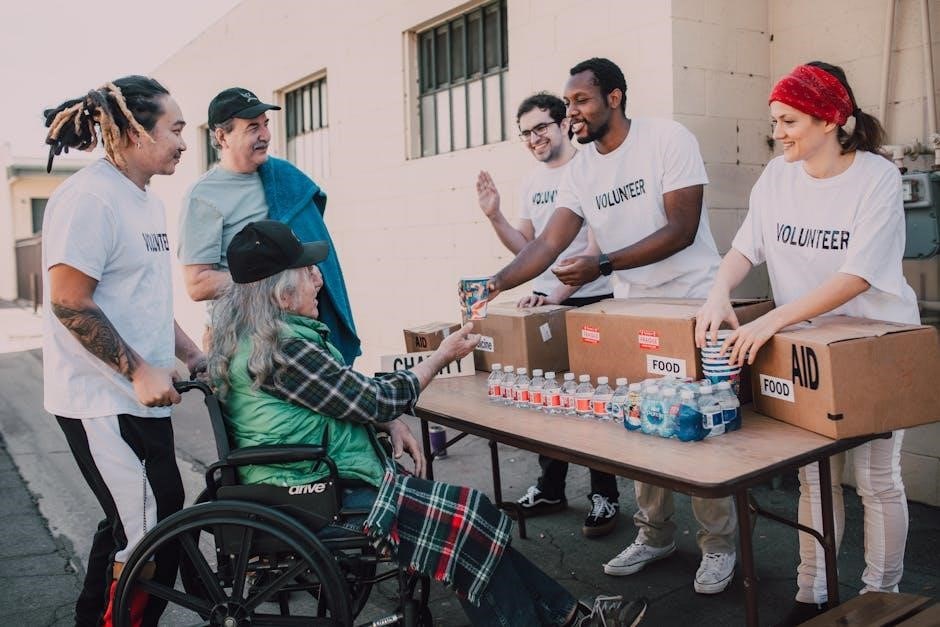Community Care Collective, Inc. focuses on empowering communities through collective care, addressing social challenges, and fostering well-being. Licensed in Massachusetts, it prioritizes support for vulnerable populations and promotes inclusive health solutions.
Overview of Community Care Collective, Inc.
Community Care Collective, Inc. is a licensed marijuana retail establishment with locations at 4 Republic Road, Billerica, MA, and 537 Great Road, Littleton, MA. Established to serve communities, it focuses on supporting populations in areas of disproportionate impact. The organization prioritizes health, wellness, and social equity, aiming to create inclusive environments for care and education. By fostering partnerships and innovative approaches, Community Care Collective addresses community needs while promoting sustainable practices and compliance with regulatory standards.
Licensing and Establishment Details
Community Care Collective, Inc. holds retail licenses for marijuana establishments in Massachusetts. Its locations at 4 Republic Road, Billerica, MA, and 537 Great Road, Littleton, MA, operate under strict regulatory compliance. The organization ensures adherence to state laws and Commission guidelines, maintaining transparency in its operations. Licensing details are publicly available, emphasizing accountability and commitment to community standards. These establishments are integral to providing safe, legal cannabis products while supporting local economies and addressing social equity through responsible business practices.
Mission Statement and Objectives
Community Care Collective, Inc. is dedicated to serving populations in areas of disproportionate impact, fostering equity and well-being. Their mission emphasizes empowerment through collective action, prioritizing community needs and social responsibility. By addressing disparities, they aim to create inclusive environments that promote health and resilience. Objectives include providing accessible support, advocating for systemic change, and ensuring sustainable, community-driven solutions. Their work is rooted in collaboration and a commitment to improving quality of life for all members, ensuring that care is both equitable and impactful.
Concept of Collective Care
Collective care emphasizes shared responsibility and mutual support within communities, fostering inclusivity and equity. It prioritizes cultural activities, nature, and social ties to enhance well-being and resilience.
Definition and Principles of Collective Care
Collective care is a shared responsibility among community members to support one another, emphasizing inclusivity and equity. Rooted in mutual aid, it prioritizes cultural and natural well-being, fostering resilience. Principles include collaboration, empathy, and empowerment, aiming to address disparities and promote holistic health. By valuing interconnectedness, collective care strengthens social ties, creating sustainable systems for all, particularly marginalized groups, to thrive collectively.
Historical Context of Collective Care Movements
Collective care movements emerged as a response to societal fragmentation and the devaluation of care work, often associated with gender roles. Rooted in social movements of the 1960s-70s, these initiatives emphasized community empowerment and mutual aid. The Care Manifesto highlights the need for radical care reimagining, addressing systemic disparities. Historical practices, such as shared responsibilities in indigenous communities, influenced modern collective care frameworks. These movements integrate nature, culture, and health promotion, reflecting a shift toward holistic, inclusive care systems that prioritize equity and resilience across generations.
Importance of Community in Care Systems
Communities play a vital role in care systems by fostering mutual support and reducing disparities. Collective care strengthens social bonds, empowering individuals to address shared challenges. By prioritizing community well-being, care systems promote resilience and sustainability. This approach ensures equitable access to resources, particularly for vulnerable populations. Community-driven initiatives also encourage active participation, creating a sense of ownership and accountability. Ultimately, the integration of community in care systems enhances overall quality of life, aligning with health promotion and social equity goals.

Community Organizing and Participatory Action Research
Community organizing empowers populations through collective action, while participatory action research engages communities in decision-making, fostering sustainable solutions and improving health equity.
Goals and Methods of Community Organizing
Community organizing aims to empower populations through collective action, addressing disparities and fostering equity. Methods include outreach, education, and inclusive decision-making processes. By engaging diverse stakeholders, organizers build capacity for sustainable solutions, ensuring communities actively participate in improving their well-being and health outcomes.
Role of Participatory Action Research in Care Systems
Participatory Action Research (PAR) plays a crucial role in care systems by engaging communities as active collaborators in identifying needs and co-creating solutions. This approach fosters empowerment and ensures interventions are culturally relevant and sustainable. PAR emphasizes equity, enabling marginalized groups to influence policies and practices. By combining research with action, it bridges gaps between theory and practice, promoting systemic change and improving health outcomes. This collaborative method ensures care systems are responsive, inclusive, and grounded in community priorities, ultimately enhancing overall well-being.
Empowering Communities Through Collective Action
Empowering communities through collective action involves fostering collaboration and shared responsibility to address social challenges. This approach strengthens social ties, enabling communities to take ownership of their well-being. By pooling resources and knowledge, collective action promotes sustainable solutions tailored to local needs. It also amplifies voices, ensuring marginalized groups are heard. Empowerment fosters resilience, equipping communities to navigate crises and advocate for their rights. Through collective efforts, communities can challenge systemic inequities and create inclusive environments that support holistic well-being, ultimately driving transformative change and fostering a culture of solidarity and mutual support.

Research Studies on Collective Care
Research highlights studies by D. Petrakis on health impacts of weapons and G. Tellnes on nature’s role in health promotion, emphasizing collective care’s transformative potential globally.
Research by D. Petrakis on Chemical, Biological, and Nuclear Weapons
D. Petrakis’s research examines the devastating health effects of chemical, biological, and nuclear weapons, emphasizing their impact on human well-being and community health. The study highlights the importance of collective care strategies to mitigate these effects, focusing on community-level responses and support systems. Petrakis’s work underscores the need for proactive health policies and international cooperation to address the long-term consequences of such weapons. This research aligns with the mission of Community Care Collective, Inc., which prioritizes vulnerable populations and promotes holistic health solutions.
Study by G. Tellnes on Nature, Culture, and Health Promotion
G. Tellnes’s research explores the interconnectedness of nature, culture, and health promotion, emphasizing their role in enhancing quality of life. The study highlights how nature-based initiatives and cultural activities foster well-being and resilience within communities. Tellnes underscores the importance of integrating these elements into public health strategies to create sustainable care systems. This approach aligns with collective care principles, promoting holistic health and environmental sustainability. The findings provide valuable insights for designing community care models that prioritize cultural and natural resources for improved health outcomes.
Analysis of Care Policies and Their Impact on Families
Research indicates that current care policies often place undue burdens on families, particularly in under-resourced communities. The evidence suggests that these policies frequently fail to address the unique needs of diverse family structures, leading to increased stress and reduced well-being. As a result, there is a growing need for alternative approaches that prioritize equitable distribution of care responsibilities and provide adequate support systems. Such reforms could alleviate the strain on families and foster healthier, more sustainable care environments. This aligns with the goals of collective care models, which emphasize shared responsibility and community-driven solutions.

Business and Operational Aspects
Community Care Collective, Inc. operates under a detailed business plan, ensuring compliance with regulatory standards and fostering operational efficiency to support its mission of equitable care delivery.
Business Plan of Community Care Collective, Inc.
Community Care Collective, Inc.’s business plan outlines strategic objectives, financial projections, and operational strategies. It emphasizes sustainable practices, community engagement, and partnerships to achieve its mission of providing equitable care. The plan includes detailed market analysis, revenue models, and growth strategies, ensuring alignment with regulatory requirements and community needs. By fostering collaboration and innovation, the organization aims to enhance service delivery and expand its impact.
License Types and Operational Strategies
Community Care Collective, Inc. operates under retail licenses for marijuana establishments in Massachusetts. Their operational strategies focus on compliance, sustainability, and community engagement. The organization ensures adherence to state regulations while implementing efficient practices to maintain quality and accessibility. Strategic partnerships and innovative approaches are central to their operational framework, ensuring long-term viability and positive community impact.
Contracting with Licensed Establishments
Community Care Collective, Inc. contracts with licensed establishments to procure marijuana products, ensuring compliance with state regulations. These contracts are integral to their operational model, fostering partnerships that uphold quality and safety standards. By collaborating with licensed entities, the collective maintains a reliable supply chain and expands access to necessary products; This approach aligns with their commitment to serving communities effectively while adhering to legal and operational guidelines. Such strategic contracting ensures transparency, accountability, and consistency in delivering services to their target populations.

Community Engagement and Support
Community Care Collective fosters connections through volunteer programs, empowering individuals and families. Their support services promote inclusivity, ensuring access to vital resources for all community members.
Volunteer Programs and Community Participation
Community Care Collective, Inc. emphasizes the importance of volunteer programs to foster community engagement. These initiatives empower individuals to contribute meaningfully, creating a supportive network. Volunteers participate in various activities, from health promotion to educational workshops, ensuring accessible resources for all. The collective encourages collaborative efforts, promoting skill development and leadership. By involving diverse community members, the programs strengthen social bonds and address local needs. This approach ensures that everyone has the opportunity to thrive, aligning with the organization’s mission of inclusivity and empowerment. Volunteer participation is vital to sustaining these impactful community-driven initiatives.
Support for Individuals with Special Needs
Community Care Collective, Inc. prioritizes inclusive support for individuals with special needs, ensuring access to tailored resources and services. Programs focus on enhancing independence, fostering social integration, and improving quality of life. The collective collaborates with healthcare providers and local organizations to offer adaptive activities and skill-building workshops. Volunteers play a crucial role in providing personalized assistance, enabling participants to engage fully in community life. This holistic approach ensures that individuals with special needs receive the care and empowerment necessary to thrive, aligning with the collective’s mission of equity and compassion.
Psycho-Social Support and Health Promotion
Community Care Collective, Inc. emphasizes psycho-social support as a cornerstone of its services, addressing mental and emotional well-being through tailored programs. These initiatives foster resilience, reduce stigma, and promote overall health. Activities include group therapy sessions, stress management workshops, and educational seminars on mental health. The collective also partners with local organizations to provide accessible resources, ensuring individuals can thrive in their communities. By integrating health promotion with social support, the collective aims to create a nurturing environment that empowers individuals to maintain their well-being and lead fulfilling lives.

Policy and Regulatory Framework
Community Care Collective, Inc. operates under strict state regulations, ensuring compliance with licensing requirements and maintaining transparency through detailed compliance reports to build trust and accountability.
Overview of Relevant Policies and Regulations
Community Care Collective, Inc. operates under state regulations, ensuring compliance with licensing requirements for marijuana establishments. The organization adheres to health and safety standards, maintaining transparency through detailed compliance reports. Regulatory frameworks guide operational strategies, including contracting with licensed establishments and obtaining necessary permits. Policies emphasize community impact, prioritizing support for disproportionately affected populations. Regular audits and reporting ensure accountability, fostering trust and adherence to legal standards. These regulations aim to protect public health while enabling sustainable community care solutions.
Impact of Care Policies on Communities
Community care policies significantly influence social dynamics, often placing undue burdens on families. Research highlights the need for alternatives to current systems, emphasizing collective approaches. These policies shape health outcomes, access to resources, and social equity. Effective care policies foster inclusive solutions, reducing disparities and promoting well-being. However, inadequate frameworks can strain community networks, underscoring the importance of adaptive, equitable systems. The impact of these policies is profound, requiring ongoing evaluation to ensure they meet the evolving needs of diverse populations and uphold the principles of collective care and shared responsibility.
Future Directions for Collective Care Policies
Future collective care policies must prioritize inclusivity, equity, and sustainability. Emphasizing community engagement and participatory research will drive effective solutions. Integrating technology, such as digital platforms, can enhance care coordination and accessibility. Policies should also address cultural differences, ensuring tailored approaches for diverse populations. Global health initiatives offer valuable models, highlighting the importance of collaboration. By fostering innovation and leveraging data, collective care systems can become more resilient and adaptive, ensuring long-term benefits for communities worldwide while addressing emerging challenges in healthcare and social support.

Collective Care in Academic and Professional Contexts
Collective care is studied in academia and applied professionally through community organizing, participatory research, and interdisciplinary collaboration, fostering equity and sustainability in health and social systems.
Role of Collective Care in Social Movements
Collective care plays a pivotal role in social movements by fostering solidarity and shared responsibility. It emphasizes mutual support, addressing systemic inequities, and empowering marginalized communities. Through grassroots organizing, collective care strengthens social cohesion, enabling movements to sustain long-term activism. This approach prioritizes the well-being of individuals within the movement, ensuring resilience against adversity. By integrating care into activism, it challenges traditional power structures, promoting equitable solutions. Collective care thus becomes a transformative force, driving social change and creating inclusive, compassionate communities.
Academic Research on Collective Care Practices
Academic research highlights collective care as a transformative approach, emphasizing shared responsibility and mutual support. Studies by D. Petrakis and G. Tellnes explore how collective care fosters resilience, improves health outcomes, and strengthens community bonds. These works underscore the importance of integrating care into societal structures, addressing disparities, and promoting well-being. Research also examines the intersection of care with cultural and environmental factors, offering insights into sustainable, inclusive care systems. By bridging theory and practice, academic inquiry informs policy and grassroots initiatives, advancing collective care as a vital component of equitable societies.
Professional Development in Collective Care Fields
Professional development in collective care emphasizes building skills in health promotion, community engagement, and participatory research. Training programs focus on fostering a responsible attitude toward health, as highlighted by AV Martirosov’s study. These initiatives equip professionals with the tools to address diverse community needs effectively. Continuous learning opportunities, supported by organizations like Community Care Collective, Inc., ensure that caregivers stay updated on best practices, promoting resilience and well-being in the populations they serve.
Technological and Digital Aspects
Digital platforms and telehealth solutions enhance collective care coordination, enabling remote support and data-driven health management for communities.
Digital Platforms for Collective Care Coordination
Digital platforms play a pivotal role in streamlining collective care efforts by enabling real-time communication, resource sharing, and coordinated support. These tools facilitate seamless collaboration among caregivers, organizations, and communities, ensuring efficient delivery of services. Features like scheduling systems, data analytics, and secure health information sharing enhance care coordination; Telehealth integration further expands accessibility, particularly for remote or underserved populations. By leveraging technology, digital platforms not only improve care outcomes but also foster a sense of connectivity and shared responsibility within communities, making collective care more sustainable and impactful.
Telehealth and Remote Care Solutions
Telehealth and remote care solutions are revolutionizing healthcare accessibility, enabling individuals to receive medical support from the comfort of their homes. These technologies facilitate virtual consultations, remote monitoring, and timely interventions, reducing barriers for underserved populations. Digital tools enhance continuity of care, especially for those with mobility challenges or living in remote areas. By integrating telehealth into collective care models, communities can address disparities in healthcare access, ensuring equitable delivery of services. This approach not only improves health outcomes but also strengthens the resilience of care systems, fostering a more inclusive and sustainable future for all.
Use of Data in Collective Care Systems
Data plays a pivotal role in enhancing collective care systems by providing insights into community needs, tracking health trends, and evaluating care outcomes. Through participatory methods, data is collected to ensure inclusivity and representativeness, aiding in resource allocation and monitoring program effectiveness. Telehealth solutions generate valuable information for improving remote care services. Ethical data handling is crucial to maintain privacy and security. By integrating analytics, data informs policy development and predicts future care needs, fostering sustainable and effective care models that address diverse community requirements responsibly. This data-driven approach ensures that collective care systems evolve to meet the dynamic needs of the populations they serve, promoting equity and improved health outcomes.

Community Care Collective Documents
Key documents include business plans, executive summaries, and compliance reports, ensuring transparency and accountability. PDFs like the Community Care Collective Dev Agreement and HCA are publicly accessible, fostering trust and collaboration in collective care initiatives.
Overview of Key Documents (PDFs)
The Community Care Collective, Inc. provides essential documents in PDF format to ensure transparency and accountability. Key documents include the Business Plan, which outlines operational strategies and goals, and the Executive Summary, offering a concise overview of the organization’s mission and objectives. Additionally, Compliance and Regulatory Reports detail adherence to licensing requirements and industry standards. Other critical PDFs, such as the Community Care Collective Dev Agreement and HCA (Health Care Agreement), outline partnerships and health care protocols. These documents are publicly accessible, fostering trust and collaboration in collective care initiatives.
Business Plan and Executive Summary
The Business Plan outlines Community Care Collective, Inc.’s strategic goals, operational framework, and financial projections. The Executive Summary provides a concise overview of the organization’s mission, targeting underserved populations. It emphasizes sustainable practices and community partnerships. The plan also includes strategies for contracting with licensed establishments, ensuring compliance with regulatory standards. By focusing on empowerment and collective care, the Business Plan and Executive Summary serve as foundational documents guiding the organization’s efforts to deliver equitable health solutions and foster community well-being effectively.
Compliance and Regulatory Reports
Community Care Collective, Inc. maintains strict adherence to regulatory standards, ensuring all operations comply with state and federal requirements. Regular audits and detailed reports are conducted to verify licensing accuracy and operational integrity. These reports include documentation of contracted partnerships, product sourcing, and adherence to health and safety protocols. Compliance is a cornerstone of the organization’s commitment to accountability and transparency, ensuring that all activities align with legal and ethical standards while serving the community effectively and responsibly. This ensures trust and confidence in the collective’s operations and outcomes.

Global Perspectives on Collective Care
Global collective care models emphasize cultural diversity, international collaboration, and universal well-being, fostering inclusive health practices across borders and communities worldwide.
International Models of Collective Care
International models of collective care highlight diverse approaches to community well-being, such as Scandinavian nations’ emphasis on social equity and Japan’s focus on community engagement. Latin American collectives often prioritize solidarity and mutual aid, while European systems integrate public health with cultural practices. These global strategies underscore the importance of adapting care systems to local contexts, ensuring inclusivity and accessibility. By learning from these models, communities worldwide can foster resilience and equity, promoting holistic well-being through shared responsibility and cultural sensitivity.
Cultural Differences in Care Practices
Cultural differences significantly influence care practices, shaping how communities prioritize well-being. In some cultures, family-centric care is paramount, while others emphasize collective responsibility. For instance, Indigenous communities often integrate nature and spirituality into care routines, reflecting their holistic view of health. Conversely, Western models may focus more on individualized solutions. These variations highlight the importance of cultural sensitivity in care systems, ensuring practices align with community values and traditions. By respecting these differences, collective care models can become more inclusive and effective, fostering trust and cooperation within diverse populations.
Global Health Initiatives and Collective Care
Global health initiatives increasingly adopt collective care principles to address health disparities and promote well-being. Organizations like the Collective Impact Forum and the Aspen Institute champion collaborative approaches, emphasizing community-driven solutions. These efforts often integrate local traditions with modern health practices, ensuring cultural sensitivity. By fostering partnerships and resource sharing, global initiatives enhance access to care, particularly in underserved regions. Collective care models in global health prioritize equity, resilience, and sustainability, aligning with the United Nations’ health goals and fostering stronger, healthier communities worldwide through unified action and shared responsibility.

Future of Collective Care
The future of collective care lies in innovative, community-driven solutions, emphasizing sustainability, equity, and technology. It envisions resilient systems fostering holistic well-being for all individuals and communities globally.
Emerging Trends in Community Care
Emerging trends in community care emphasize digital platforms, telehealth, and data-driven solutions to enhance accessibility and efficiency. There is a growing focus on sustainability, integrating nature and cultural activities into care practices, as highlighted by researchers like G. Tellnes. Community organizing and participatory action research are gaining traction, empowering individuals to take active roles in their health and well-being. Additionally, the importance of psycho-social support and inclusive policies is being prioritized to address disparities and promote equity. These trends reflect a shift toward holistic, community-centric care models that foster resilience and collective well-being.
Innovative Approaches to Collective Care
Innovative approaches to collective care include integrating telehealth solutions, leveraging digital platforms for care coordination, and utilizing data analytics to improve service delivery. Community organizing and participatory action research are fostering empowerment and inclusivity. Nature-based and cultural activities, as highlighted by G. Tellnes, are being incorporated to promote holistic well-being; Psycho-social support and health promotion programs are also gaining prominence, addressing disparities and enhancing resilience. These strategies aim to create sustainable, equitable care systems that prioritize community needs and foster collective responsibility for health and well-being.
Sustainability of Collective Care Models
Sustainability in collective care models relies on community-driven initiatives, resource allocation, and long-term policy support. Digital platforms enhance coordination, while nature-based activities promote well-being. Psycho-social support and cultural programs foster resilience. Transparent governance and community engagement ensure equitable access. Continuous feedback loops and adaptive strategies maintain relevance. By integrating technology, education, and inclusive practices, collective care models can thrive, addressing disparities and fostering healthier communities for future generations.
